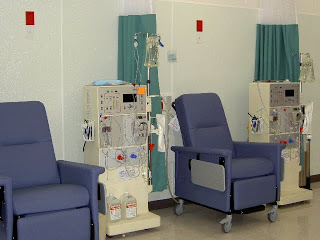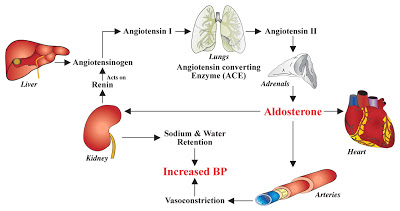 It’s a hot topic amongst dialysis centers around the country: bundling. Here’s my attempt to explain it in a brief manner. If anybody has corrections or comments about this explanation, feel free to make them known.
It’s a hot topic amongst dialysis centers around the country: bundling. Here’s my attempt to explain it in a brief manner. If anybody has corrections or comments about this explanation, feel free to make them known.
With the Social Security Act of 1973, all U.S. ESRD patients were given the right to free dialysis–and since that time, the ESRD Program has comprised a very significant portion of the overall Medicare Budget. The Centers for Medicare and Medicaid Services (CMS), a division of the Department of Health and Human Services (HHS), is in charge of administering the ESRD Program and setting the reimbursement prices for dialysis centers.
Currently, CMS divides the ESRD budget into two distinct services. First, there is a “bundled” payment which takes into account all the nursing, dialysis equipment, and many of the routine lab tests; essentially, one lump sum per patient per dialysis treatment is given which does not vary. Second, there is a category of “separately billable” items which includes the injected medications administered during dialysis and a few of the more recent lab tests. According to the current plan, each “separately billable” item is reimbursed at a rate 6% above the manufacturers’ average sales price (ASP). Dialysis centers can make a profit from this policy, and accordingly, the more “separately billable” items are ordered, the greater the ability to generate profit. This has been especially welcomed by dialysis units, as the bundled payment has not been adjusted for inflation and the units rely more and more heavily on “separately billable” items to cover the increasing costs of running a center.
There is now a strong push by CMS to change the ESRD policy such that the entire dialysis process–both the dialysis treatment itself as well as any injectable medications or labs–become a single “bundled payment.” According to this report by the Government Accountability Office (GAO), a single bundled dialysis care payment would “increase efficiency and clinical flexibility.”
The medication Epogen is central to understanding the current move towards a bundled payment. Epogen was by far the most pricey “separately billable item” within the ESRD budget, accounting for about $2 billion annually. In the report, the fact that Amgen (the company which makes Epogen) has no competition on the market is cited as a reason for these staggering costs. The report goes on to suggest that placing Epogen within a bundled payment would force physicians to use the drug more judiciously and allow them to adapt strategies that could minimize Epogen doses–for example, subcutaneous rather than intravenous dosing.
The proposal of bundled dialysis payments is, understandably, still a controversial one. Will dialysis units be fairly compensated in a bundled system? We don’t have the proposed numbers yet to judge. Will patients still have access to important drugs and breakthroughs? Some have even suggested that a bundling policy might discourage some dialysis centers from taking African-American patients, who tend to have higher Epogen requirements, and therefore lead to racial discrimination; medically complex patients might also fall into the category of an “undesirable dialysis patient” from a cost perspective. The one thing that is for sure is that whatever the policy turns out to be, it will undoubtedly have major effects on nearly every nephrologist practicing with the U.S.



Bill,
Good comments, and yes it deserves to mentioned that Medicare will only reimburse 80% of the dialysis fee, so you are correct in pointing out that it is not entirely "free." As a young nephrologist who has lived a mostly sheltered life in the realm of academia, I am still learning about the financial aspects of dialysis care in the "real world." I was surprised to find out recently, for instance, that the reimbursement rates for dialysis centers vary dramatically throughout the United States, for reasons that are not entirely clear to me.
I am not sure what the effects of changing to a weekly or monthly reimbursement plan would involve. I would hope that whatever system is put in place would allow for greater patient/nephrologist flexibility in choosing options such as daily dialysis or home dialysis.
Interesting article… it is free dialysis to us all by the government and I think they have the right to streamline and optimize the system to help cut down on costs. Will bundling curve the excess use of epogen and other expensive dialysis meds? I think it will. After all Epogen is now considered very dangerous in large doses. As for the health reform, thats another path to streamlining the healthcare system. However, I believe we need to be sure they do it right…. people will always be scared to make changes. Was not we anxious when we first decided to switch to home dialysis? I also think there's a new lineup of Pharm.. that will offer better cost effective anemia meds than Epogen… some that will only require one shot per month….
"all U.S. ESRD patients were given the right to free dialysis–and since that time, the ESRD Program has comprised a very significant portion of the overall Medicare Budget."
It should be noted that Medicare mostly pays 80% of allowed charges which is not quite the same as a right to free dialysis. Marking the 80% nature of Medicare coverage is important if routine ESRD labs are included in the expanded payment.
Currently these are billed entirely to Medicare after the change patients will be obliged to pay 20% of their cost – through secondary insurance or self pay. It represents a cost shift of several hundreds of dollars.
Nathan I'm wondering what your thoughts are on changing the payment frequency – from per treatment to weekly or monthly?
Thanks for the comments. I read the link to "Fairness in Bundling Epo" and it is interesting.
There is an article on race & the bundling proposal in the most recent issue of ASN's Kidney News:
http://www.asn-online.org/publications/kidneynews/archives/2009/jul/KN_July09.pdf
I agree with Zach, decisions based on scare tactics has no place in health care policy. I hope that we are moving toward science based policy formation. Epoetin (Epogen) is an excellent case example. See our blog entry at: http://www.renalbusiness.com/articles/fairness-bundling-epo,p6.html
"Some have even suggested that a bundling policy might discourage some dialysis centers from taking African-American patients, who tend to have higher Epogen requirements, and therefore lead to racial discrimination"
Scare tactics in the renal industry?
I'm shocked, shocked!